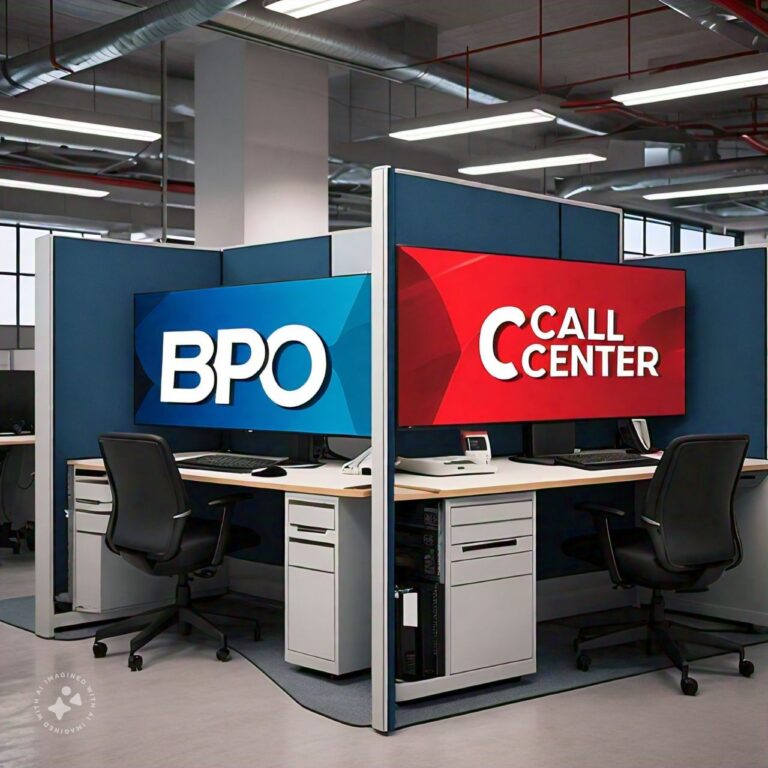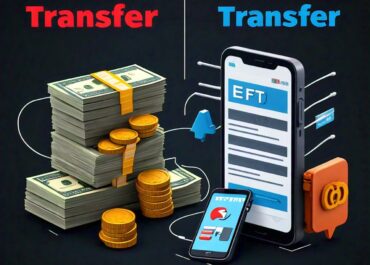
Differences Between and
In today’s globalized business environment, many companies rely on outsourcing to streamline operations and reduce costs. Business Process Outsourcing (BPO) and call centers are two common outsourcing models that are often used interchangeably. However, they differ in their scope and functions.
BPO (Business Process Outsourcing) involves contracting specific business processes to external service providers, encompassing a wide range of services, such as human resources, accounting, IT services, and customer support. A call center, on the other hand, is a more focused type of BPO that specializes in handling customer interactions, primarily through phone calls, although modern call centers also manage email, chat, and social media communications.
Understanding the differences between BPO and call centers can help businesses choose the right outsourcing model to suit their specific needs. While BPO encompasses a broader range of business functions, call centers are a subset of BPO that focuses solely on customer communication.
Overview
What is BPO?
Business Process Outsourcing (BPO) refers to the practice of contracting specific business operations or processes to external third-party providers. These providers handle essential but non-core functions on behalf of the hiring company. The primary objective of BPO is to improve efficiency, reduce operational costs, and allow businesses to focus on their core competencies.
BPO services can be categorized into two main types: back-office outsourcing and front-office outsourcing. Back-office services typically include internal business processes such as accounting, payroll, and IT services, while front-office services involve customer-facing activities such as customer support, sales, and technical support.
BPO is commonly used in industries such as telecommunications, finance, healthcare, retail, and manufacturing. The global BPO market has grown significantly over the past few decades due to advancements in technology, globalization, and the need for businesses to remain competitive in a fast-paced environment.
Key Characteristics of BPO
- Wide Range of Services: BPO covers a broad spectrum of business functions, from customer service to finance, human resources, procurement, IT services, and marketing. Companies can outsource entire departments or just specific functions.
- Cost-Effective Solutions: Outsourcing non-core business functions to a BPO provider can significantly reduce operational costs. Companies save on infrastructure, staffing, training, and technology investments.
- Focus on Core Business: By outsourcing peripheral activities, companies can concentrate on their core competencies and strategic goals, allowing them to enhance productivity and innovation.
- Scalability: BPO providers offer flexible solutions that can easily scale according to the company's needs. Whether it’s handling seasonal spikes or expanding operations, BPO can accommodate fluctuating demands without requiring companies to invest in additional resources.
- Global Reach: Many BPO providers operate internationally, giving companies access to a global talent pool. Outsourcing to countries like India, the Philippines, and Mexico is common due to lower labor costs and access to skilled professionals.
- Technological Expertise: BPO providers often have access to the latest technology, tools, and software to efficiently handle business processes. This includes automation, artificial intelligence, and advanced analytics, which help improve efficiency and accuracy.
Types of BPO Services
- Back-Office BPO: Involves outsourcing internal business functions that do not require direct interaction with customers. Common back-office services include:
- Accounting and Finance: Bookkeeping, payroll processing, tax preparation, and financial reporting.
- Human Resources: Recruitment, employee training, benefits administration, and performance management.
- IT Services: Infrastructure management, software development, technical support, and cybersecurity.
- Data Entry: Inputting, verifying, and managing data for various purposes.
- Front-Office BPO: Deals with customer-facing activities that require direct interaction with clients or customers. Examples of front-office services include:
- Customer Support: Handling customer inquiries, complaints, and feedback through phone, email, or chat.
- Sales and Marketing: Managing outbound sales calls, lead generation, market research, and social media engagement.
- Technical Support: Providing troubleshooting assistance for technical issues related to products or services.
Advantages of BPO
- Cost Savings: One of the primary benefits of BPO is cost reduction. By outsourcing non-core functions, companies can save on labor, infrastructure, and technology expenses.
- Access to Expertise: BPO providers often specialize in specific industries or functions, offering a high level of expertise and experience that may not be available in-house.
- Improved Efficiency: Outsourcing to a BPO provider allows businesses to streamline operations and improve efficiency by leveraging the provider's resources and technology.
- Scalability: BPO services are highly scalable, allowing companies to adjust service levels according to changing business needs without having to invest in additional resources.
- Focus on Core Competencies: By outsourcing non-core tasks, companies can focus their attention and resources on their core business functions, leading to increased productivity and innovation.
- 24/7 Operations: Many BPO providers offer round-the-clock services, ensuring continuous operations across different time zones. This is particularly beneficial for customer support and technical assistance functions.
Limitations of BPO
- Loss of Control: Outsourcing business processes can result in a loss of direct control over certain aspects of operations, which may lead to challenges in maintaining quality and consistency.
- Security Risks: Outsourcing sensitive business functions such as finance or HR can expose the company to security and privacy risks if the BPO provider does not have adequate safeguards in place.
- Cultural and Communication Barriers: Working with offshore BPO providers may involve language barriers and cultural differences, which can impact communication and overall service delivery.
- Dependency on the Provider: Over-reliance on a BPO provider can lead to operational disruptions if the provider experiences issues such as service outages, financial instability, or employee turnover.
Overview
What is a Call Center?
A call center is a facility or department within a company that handles inbound and outbound customer interactions, primarily through phone calls. Call centers serve as a central point for managing customer service, sales inquiries, technical support, and other communications. Modern call centers may also handle communication through email, live chat, social media, and other digital channels, evolving into what is known as a contact center.
Call centers can be operated in-house or outsourced to third-party providers, making them a popular choice for companies looking to manage customer interactions more efficiently. Call centers focus on delivering prompt, effective communication between businesses and their customers, helping to resolve issues, answer questions, and promote products or services.
Key Characteristics of Call Centers
- Customer Interaction: The primary function of a call center is to manage communication with customers, whether it's addressing their inquiries, resolving issues, or providing support for products and services.
- Inbound and Outbound Calls: Call centers typically manage both inbound calls (customers calling the company) and outbound calls (company representatives contacting customers). Inbound calls are generally related to customer service or technical support, while outbound calls often focus on sales, marketing, or customer follow-ups.
- Technology-Driven: Call centers rely heavily on technology, including telephony systems, customer relationship management (CRM) software, and call routing systems to efficiently handle large volumes of customer interactions.
- Multichannel Communication: While traditionally focused on phone calls, many call centers have evolved into contact centers, managing communication across multiple channels, including email, live chat, and social media.
- Performance Metrics: Call centers are often evaluated based on key performance indicators (KPIs) such as average handle time (AHT), first-call resolution (FCR), customer satisfaction (CSAT), and service level agreement (SLA) adherence.
- Agent Training and Expertise: Call center agents receive specialized training to handle customer interactions professionally and efficiently. This training may focus on specific products, services, or technical support processes.
Types of Call Centers
- Inbound Call Centers: These centers primarily handle incoming customer calls, such as those related to product inquiries, customer service, billing issues, and technical support.
- Outbound Call Centers: Outbound centers focus on making calls to potential or existing customers for purposes such as sales, lead generation, surveys, or follow-up support.
- Blended Call Centers: A blended call center handles both inbound and outbound calls, allowing agents to switch between handling customer inquiries and making proactive sales or support calls as needed.
- Virtual Call Centers: These are remote call centers where agents work from various locations, often from home, using cloud-based technology to manage calls. Virtual call centers offer flexibility and cost savings for businesses.
- Automated Call Centers: Some call centers use automation technology, such as interactive voice response (IVR) systems, to manage routine inquiries or direct customers to the appropriate agent or department.
Advantages of Call Centers
- Improved Customer Service: Call centers allow businesses to provide timely, consistent, and professional customer service, improving overall customer satisfaction and retention.
- Increased Sales: Outbound call centers help businesses generate leads, close sales, and follow up with customers to increase revenue.
- Scalability: Call centers can scale up or down based on customer demand, making them a flexible solution for businesses that experience seasonal or fluctuating call volumes.
- Specialized Support: Call centers can provide specialized technical support or customer service for complex products or services, ensuring customers receive accurate and helpful information.
- 24/7 Availability: Many call centers offer round-the-clock support, ensuring that customers can get assistance at any time, regardless of time zones.
Limitations of Call Centers
- High Operating Costs: Running a call center, particularly an in-house center, can be expensive due to staffing, infrastructure, and technology costs.
- Agent Turnover: Call centers often experience high agent turnover rates due to the repetitive and sometimes stressful nature of the job. This can lead to additional costs in recruiting and training new agents.
- Limited Personalization: Call centers handle large volumes of calls, which can make it difficult to provide personalized service for every customer.
- Language Barriers: Outsourcing call centers to countries with lower labor costs can result in language and communication challenges, potentially impacting the quality of customer interactions.
Differences Between and
- Scope:
- BPO: Encompasses a wide range of business processes, including both front-office (customer-facing) and back-office (internal) functions. BPO can cover services such as HR, finance, IT, procurement, and more.
- Call Centers: Focus exclusively on customer interactions, primarily through phone calls. Call centers are a subset of BPO that specialize in customer service, technical support, and sales communication.
- Functionality:
- BPO: Handles multiple business functions across various departments, providing comprehensive outsourcing solutions.
- Call Centers: Handle a specific aspect of customer service and sales, concentrating on managing customer communication via phone, email, chat, and other channels.
- Service Delivery:
- BPO: Offers both back-office (e.g., data entry, HR) and front-office (e.g., customer support) services.
- Call Centers: Provide primarily front-office services, including handling customer inquiries, resolving issues, and supporting product sales.
- Technology:
- BPO: Utilizes a wide range of technologies, including software for accounting, human resources, procurement, and more.
- Call Centers: Primarily use telephony systems, CRM software, and customer interaction platforms to manage high volumes of customer communication.
- Cost Structure:
- BPO: Offers broader, more comprehensive outsourcing services that may involve significant setup and ongoing management costs.
- Call Centers: Focused on handling customer interactions, and while they can be expensive, especially for in-house operations, they tend to be more affordable than full-scale BPO services.
Conclusion
BPO and call centers are both important components of the modern business landscape, offering companies the ability to outsource various functions to improve efficiency, reduce costs, and focus on core activities. BPO is a broader concept that covers a wide range of business processes, including both back-office and front-office services. Call centers, on the other hand, are a more specific type of BPO that focuses on handling customer interactions, primarily through phone calls.
While both BPO and call centers offer valuable outsourcing solutions, the key differences lie in their scope, functionality, and the types of services they provide. Businesses looking to outsource must consider their specific needs and objectives when choosing between BPO and call center services. Understanding the nuances between these two models can help businesses make informed decisions, ensuring they select the right outsourcing partner to enhance their operations and drive long-term success.
FAQs
Related Topics
- All
- Animals
- Diseases
- Health
- Money
- Politics
© 2024 OnYelp.com. All rights reserved. Terms and Conditions | Contact Us | About us





